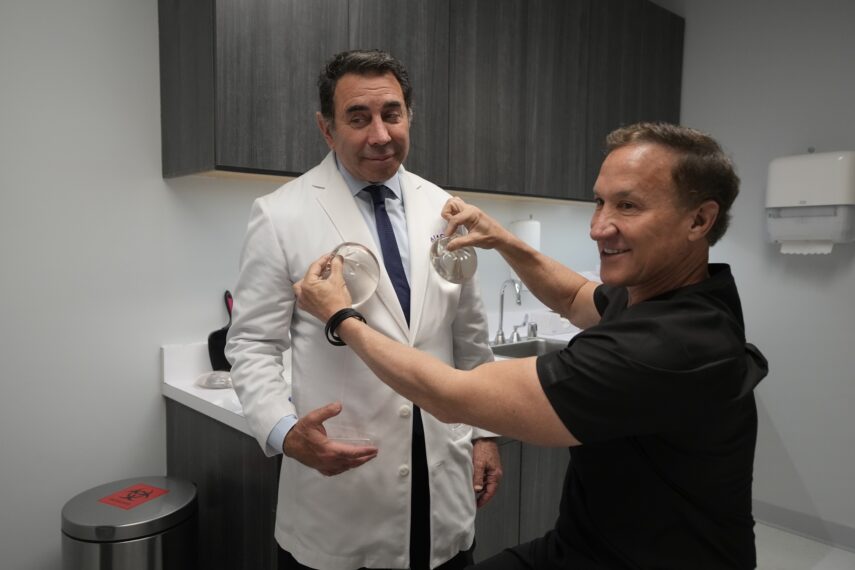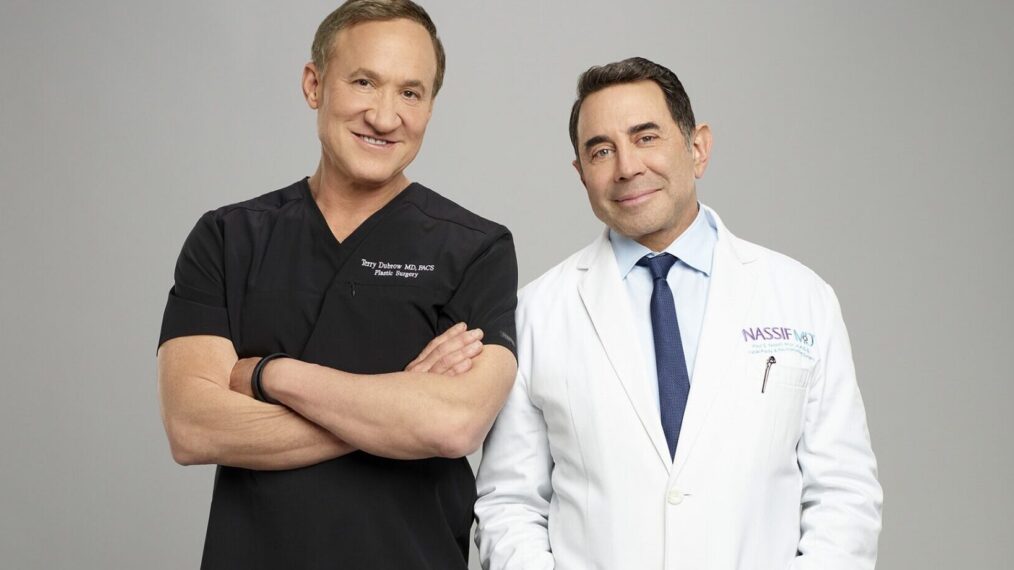Now that the holidays are over the doctors are back in the office for more Botched. Season 8 returns January 18 with our resident docs Terry Dubrow and Paul Nassif tackling some of their most challenging and heartwrenching cases so far.
Even after so many episodes, the two are still tested by the complexity of these procedures. This is whether it’s undoing prior plastic surgery fails or working with patients to help them where others weren’t able to or flat out refused. It’s providing positive outcomes to those who have endured so much pain and trauma that has made their work and the show especially meaningful.
Here the dynamic duo talks about the emotional stories ahead, their bromance, and reflecting on what will be a decade of Botched later this year.
What stands out during these next set of episodes of the season?
Dr. Terry Dubrow: The thing that makes this chunk different is that these are deformities you can see from across the room. A lot of what we’ve done in Botched in previous years people could hide. They either put on makeup or can mask whatever it is with clothes or where their hair is different. These are things from car accidents to congenital deformities. Things that have dramatically affected their lives where they really can’t go outside for a lot of these cases.
I think the producers have done a really wonderful job at transforming the show as well. The show has a different feel and format. It’s a lot funnier, too. There is a lot more from Paul and Terry’s relationship where we have a longstanding friendship and are ribbing each other. However, with this next episode coming up, if anyone makes it through without crying and having a dry eye, you need to look in the mirror and ask what happened to your heart. There is so much heart, particularly in these upcoming episodes. These patients are so incredibly desperate for our help.
Dr. Paul Nassif: I’m one of the sensitive guys, even though I do give tough love. I’ve maybe cried three or four times throughout these eight seasons. However, this season has so much trauma. We’re parents, so we’re affected. This return episode shows someone whose life was changed forever by this car accident [at age 13]. [Now 21], aside from the possibility of losing her eye, which would happen if we didn’t intervene, you also have this traumatic brain injury. It’s something you never get over.
Imagine a child being forced by friends or whatever you want to call them, to drink acid. Imagine walking around with an eggplant on the side of your face all your life. These 10 episodes you’re seeing I’ve probably cried five or six times behind the scenes, maybe more. When you have kids and relate to it, it’s something emotional as doctors we have to keep a certain calmness, but this really pulls at your heartstrings. This is a tearjerker.

Casey Durkin/E! Entertainment
You spoke a bit about Haylie, who is part of the return episode. She has endured 42 previous surgeries from this car accident where the other driver died. This Knoxville girl spent 86 days in the hospital. She is a survivor, but I’m sure having to relive this past trauma wasn’t easy for her or her parents.
Terry: Paul did the 43rd operation on the patient you’re referring to. They’ve come all the way out to Beverly Hills as the final hope. Everything is on the line. They have to relive all the emotions from the original injury and put it all on the line. I have to give it to Paul because if it didn’t work, that would be the singular most disappointing thing in her life up to date.
You’re in these high-pressure situations, but you manage to balance the seriousness with some levity. How important is it for you to have this humor to get through the day?
Terry: I think humor for us is in the mundane and ritual of being a plastic surgeon, but it’s critical. What are you supposed to do? Feel sad, and depressed, and cry through all these journeys. You need to keep the wits about you as a plastic surgeon. You need to be in a good mood. More importantly, you need to present to the patient hope and optimism. That hope and optimism is humor, so if we can lean into having a good time when trying to do these life-preserving operations, it helps us and helps the patients. It also certainly helps the family. If you can find the fun and joy, it aids in the journey.
What do the wives think of your relationship and the show over the years?
Paul: When I met Terry, I was single. The first part of his life when he was married to Heather, I was married to Adrienne Maloof. And so that was the initial process. Both of the ladies are on Real Housewives. Both of us are short-term house husbands. It was something that has always been nice because the two women liked each other. And it’s interesting now with Brittany [Pattakos]. Both of us live in L.A., when we get together we have fun and take a breath, hang out. By the way, the teasing you see us do. I have a dry sense of humor, but this guy is a comedian, truly. For 25 years, he has been the same way teasing me with or without TV. That’s something when you talk about true friends, that’s what we have been able to maintain the whole time.
Terry: I think the wives have been proud of us. They have seen us go through this journey. They know at the end of the day, these are very risky operations. We put ourselves on the line. We focus as we should on the patients and risks of the operation, whether or not we are able to fix things. Botched by the Botched doctor, you never want to have that in the media. Our wives are in the media with big Instagram accounts. They are followed very carefully. They’re concerned for us. They help us through these emotional cases.
But if things go sideways, everyone hears about it when you’re in our world. I mean I overdyed my hair the other day, and there were nine articles written about Terry’s hair dye. My wife is like, “Hey Terry, lay off the shampoo dye for a couple of days.” My hair was a little dark in Heather’s Instagram photos, and it blew up in my social media. “Terry’gone dark. He is like the new Elvis.” They are so mean, but ur wives are critical though in helping us get through these cases.
It’s 2024 in the midst of the Ozempic craze. How has this impacted your line of work?
Paul: I had a toe procedure recently. One of the questions asked of me and with all the different surgeries now is whether you need to be off Ozempic for 72 hours. You have to be careful of it. It does great things and something I will tell you is if you’re going to use it, you have to be careful. The thing is though when you lose weight immediately and really fast, that may not be the best thing. You have to be able to follow the doctor and do it the right way.
Terry: It’s actually two weeks the American Site of Anesthesia recommends. You should be off it for two weeks because when you go under anesthesia, it slows down your GI tract and predisposes you to aspiration. With these miracle weight loss drugs, I love them and they are here to stay, but they are causing a lot more muscle loss and loose skin to occur. So Paul and I are seeing people with rapid weight loss, younger facelifts, and many more tummy tucks. It used to be tummy tuck was the fifth most common procedure. Now it’s the second most. I’m sure Paul will tell you his facelift practice is a lot younger now because people are losing weight so quickly.
You are coming up on 10 years of Botched. How does that process for you?
Terry: I’ve done a lot of looking back recently because of the decade of Botched surgeries and where it has taken us as plastic surgeons. Where the show has taken the nation in terms of the word Botched. It has turned into a real term. It has shown a lot of people the downsides of plastic surgery. But also how it’s important to be careful and check your plastic surgeons’ credentials very closely and make sure you read the consent form. We’re hoping to keep doing Botched. But the reason why I think it’s getting better is that our skillset keeps expanding, allowing us to do operations that 10 years ago Paul and I wouldn’t even have tried. Now the hard ones are routine and the impossible ones are now possible.
Botched returns January 18, 10/9c, E!

